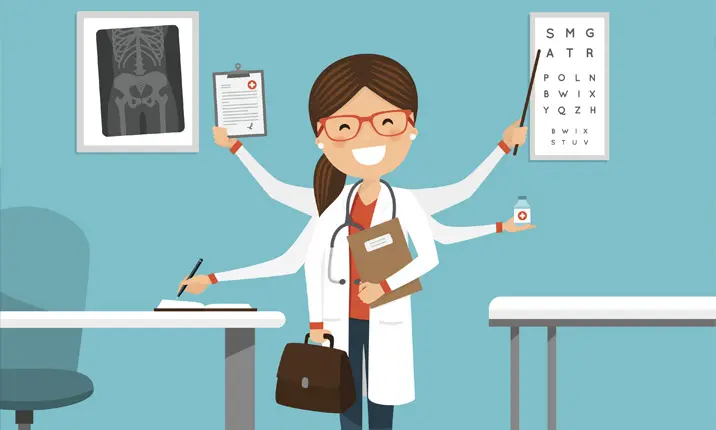-
-
Featured Care Areas


Source: Shutterstock
10 Myths About Doctors in Singapore
Last updated: Tuesday, July 9, 2019 | 4 min reading time
You've always dreamt of becoming a doctor and have done your share of research. You may think you know what it's like being a doctor, but here's the reality of being a doctor in Singapore.
Becoming a doctor requires a lot of sacrifices, both financial and personal. Some people think they're worth it, but ultimately you'll have to decide for yourself. Here are 10 common myths and misconceptions about being a doctor in Singapore that you should know.
1. Doctors in Singapore wear white coats
Doctors haven't worn white coats in Singapore in many years. Trainee medical students might still wear the traditional white coat, but most doctors now wear business casual clothing or scrubs when practicing. Surgeons will wear a gown and cap for surgery, but for standard workdays, it's more about comfort and dressing appropriately when talking to patients.
2. Being a doctor is the highest paid job you can get
Working as a doctor is comparatively well paid, but it isn’t the highest paying job in the market. A 2018 report on the top 10 highest salaries in Singapore listed technology, financial services, marketing and legal roles more lucrative than a career in medicine. Most qualified doctors also have hefty student loans to pay off from several years of schooling. You can probably count on at least $80,000 a year as a medical officer, but it can take a long time to move up to a higher level such as registrar or consultant for more pay.
3. Doctors make perfect life partners
Doctors are ordinary people, just like everyone else. Human beings are not perfect, so although doctors are usually caring, empathetic and hardworking people, they may or may not be the right life partners for you. A 2017 study published in the Singapore Medical Journal noted that 8/10 doctors feel emotionally burnt out and struggle to find a work/life balance in such a stressful and high-pressure industry. Even finding time to see a partner can be quite challenging for them, because the hours can be long.
4. Doctors can treat everything and know everything
Medicine is a huge, ever-changing landscape to work in, and it's impossible for every doctor to know everything. Instead of trying to learn as much as possible about every facet of the medical field, doctors usually choose a specialty. Even the role of general practitioner is a specialty, focusing on common illnesses and ailments. Your GP has the ability to point you in the direction of a doctor who will be able to help you with your specific concerns. The existence of medical specialities means a higher standard of care in each area.
5. Doctors are healthy
While doctors seem like superheroes when we need them to be, in reality they are subject to illness just like everyone else. Although they are perceived to be healthy, incidences of chronic diseases in medical professionals are similar to the general population. The bottom line is, doctors can get sick too.
6. Doctors run the hospital
Doctors don't run the hospital. They are part of a huge team that includes nurses, dietitians, physiotherapists, radiographers, sonographers and hospital operational staff, just to name a few. Doctors are bound by ethical codes of practice, and operate in accordance with the management hierarchy of their workplace.
7. Doctors are responsible for their patients' health
This is a complex issue, but in simple terms, a doctor is responsible for the standard of care they deliver, not the health of the patient. Doctors are committed to providing you with quality health services that are safe, efficient and effective, while at the same time respecting your rights as an individual. As a patient, you can play a part by assisting and by providing as much information as you can about your health. You should participate actively in your treatment including decisions making about your treatment plan, taking your medicines and keeping your follow-up appointments.
8. Doctors rush out from the emergency department and can perform surgery in the hospital hallway
If you're a fan of medical movies or TV shows like Grey's Anatomy, you might be under the impression that doctors frequently perform risky, intense surgical procedures in unlikely places. In reality, surgery is basically always carried out in sterile operating theatres. If a patient is in the hospital, there is no need to treat them in the hallway.
9. Doctors all look like Ellen Pompeo and George Clooney
Once again, movies can cloud our perception of real life. You might enjoy watching George Clooney in ER or Ellen Pompeo in Grey's Anatomy, but they have an entire makeup and wardrobe department that help them look flawless in their scrubs. We've said it before; doctors are human beings. Not every person looks like a movie star, but they can still be an incredible caregiver.
10. Doctors stop studying and taking exams after becoming a doctor
A career in medicine is a commitment to lifelong learning. Doctors continue to train and study in specialities long after they graduate from medical school. There are also ongoing updates and changes to hospital procedures and advancements in medicine that affect the way doctors need to operate. In order to progress from a medical officer to senior consultant you would need to spend years at each level and be accepted into a highly competitive training programme each time.
Doctor's Pay in Singapore. Retrieved 16/06/19 from http://doctors.com.sg/medical/doctors-pay-in-singapore/
Jie Ying, Foo. (2017, Nov 20) Patients Prefer Doctors in White Coats. Retrieved 16/06/19 from https://www.tnp.sg/lifestyle/health/patients-prefer-doctors-white-coats
Lai, L. Young doctors here feeling burnt out, says study. Retrieved 16/06/19 from https://www.straitstimes.com/singapore/health/young-doctors-here-feeling-burnt-out-says-study
Lim, Jen-Li. (2018, Dec 26) Which Jobs Earn the Highest Salaries in Singapore? https://www.imoney.sg/articles/highest-paying-jobs/
Jie Ying, Foo. (2017, Nov 20) Patients Prefer Doctors in White Coats. Retrieved 16/06/19 from https://www.tnp.sg/lifestyle/health/patients-prefer-doctors-white-coats
Lai, L. Young doctors here feeling burnt out, says study. Retrieved 16/06/19 from https://www.straitstimes.com/singapore/health/young-doctors-here-feeling-burnt-out-says-study
Lim, Jen-Li. (2018, Dec 26) Which Jobs Earn the Highest Salaries in Singapore? https://www.imoney.sg/articles/highest-paying-jobs/












